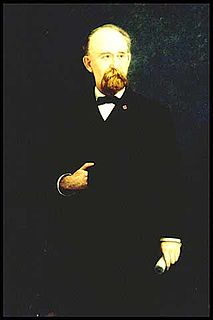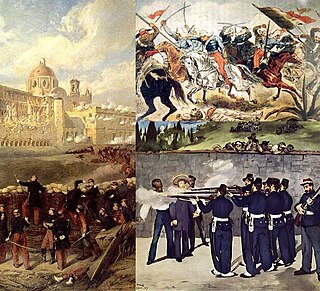
Lucius Frederick Hubbard was an American politician. The Republican served as the ninth Governor of Minnesota from January 10, 1882 to January 5, 1887. He also served as an officer in the Union Army during the American Civil War.
The Free Trade Party which was officially known as the Australian Free Trade and Liberal Association, also referred to as the Revenue Tariff Party in some states, was an Australian political party, formally organised in 1887 in New South Wales, in time for the 1887 colony election, which the party won. It advocated the abolition of protectionism, especially protective tariffs and other restrictions on trade, arguing that this would create greater prosperity for all. However, many members also advocated use of minimal tariffs for government revenue purposes only. Its most prominent leader was George Reid, who led the Reid Government as the fourth Prime Minister of Australia (1904–05). In New South Wales it was succeeded by the Liberal and Reform Association in 1902, and federally by the Anti-Socialist Party in 1906. In 1909, the Anti-Socialist Party merged with the Protectionist Party to form the Commonwealth Liberal Party.
The Protectionist Party or Liberal Protectionist Party was an Australian political party, formally organised from 1887 until 1909, with policies centred on protectionism. The party advocated protective tariffs, arguing it would allow Australian industry to grow and provide employment. It had its greatest strength in Victoria and in the rural areas of New South Wales. Its most prominent leaders were Sir Edmund Barton and Alfred Deakin, who were the first and second prime ministers of Australia.

The 1872 Canadian federal election was held from July 20 to October 12, 1872, to elect members of the House of Commons of Canada of the 2nd Parliament of Canada. Prime Minister Sir John A. Macdonald's Conservative Party remained in power, defeating the Liberals. However, the Liberals increased their parliamentary representation considerably, while the Conservative seat count remained static, giving them only six more seats than the Liberals. The election produced the country's first minority government. The support of two independent Conservative MPs functionally gave Macdonald an extremely slim majority that allowed it to survive for two years, until it fell due to scandal.

Truman Handy Newberry was an American businessman and political figure. He served as the Secretary of Navy between 1908 and 1909. He was a Republican U.S. Senator from Michigan between 1919 and 1922.
The Conservative Party of Quebec was a political party in Quebec, Canada, from 1867 until 1936, when it merged with members of the Action libérale nationale to form the Union Nationale.

In the United States, Election Day is the annual day set by law for the general elections of federal public officials. It is statutorily set by the Federal Government as "the Tuesday next after the first Monday in the month of November" equaling the Tuesday occurring within November 2 to November 8.

The 1887 Canadian federal election was held on February 22, 1887, to elect members of the House of Commons of Canada of the 6th Parliament of Canada.
Elections in Germany include elections to the Bundestag, the Landtags of the various states, and local elections.

Henry Laurens Dawes was an attorney and politician, a Republican United States Senator and United States Representative from Massachusetts. He is notable for the Dawes Act (1887), which was intended to stimulate the assimilation of Native Americans by ending the tribal government and control of communal lands. Especially directed at the tribes in Indian Territory, it provided for the allotment of tribal lands to individual households of tribal members, and for their being granted United States citizenship. This also made them subject to state and federal taxes. In addition, extinguishing tribal land claims in this territory later enabled the admission of Oklahoma as a state in 1907.

The Second French Intervention in Mexico, also known as the Second Franco-Mexican War (1861–1867), was an invasion of Mexico, launched in late 1862 by the Second French Empire, which helped replace the Mexican Republic with a monarchy, the Second Mexican Empire. Mexican monarchists came up with the initial plan to return Mexico to a monarchical form of government and invited Napoleon III to help create a government, which, in his estimations would be more favorable to French interests.

Albert Raney Anderson was a one-term U.S. Representative from Iowa's 8th congressional district in southwestern Iowa. He is best known for winning election to Congress and defeating a well-known incumbent, without winning his own party's endorsement.

Ramón Corral Verdugo was the Vice President of Mexico under Porfirio Díaz from 1904 until their resignations in May 1911.

The 1883 New York state election was held on November 6, 1883, to elect the Secretary of State, the State Comptroller, the Attorney General, the State Treasurer and the State Engineer, as well as all members of the New York State Assembly and the New York State Senate. Besides, a constitutional amendment to abolish contract labor from the state prisons was proposed and accepted with 498,402 votes for and 269,377 against.

The 1887 New York state election was held on November 8, 1887, to elect the Secretary of State, the State Comptroller, the Attorney General, the State Treasurer and the State Engineer, as well as all members of the New York State Assembly and the New York State Senate.

The 1889 New York state election was held on November 5, 1889, to elect the Secretary of State, the State Comptroller, the Attorney General, the State Treasurer, the State Engineer and a judge of the New York Court of Appeals, as well as all members of the New York State Assembly and the New York State Senate.

The 1895 New York state election was held on November 5, 1895, to elect the Secretary of State, the State Comptroller, the Attorney General, the State Treasurer, the State Engineer and a judge of the New York Court of Appeals, as well as all members of the New York State Assembly and the New York State Senate. Besides, the voters were asked if they approved of the State's issuing bonds for $9,000,000.00 to spend on canal improvements, which the electorate answered in the affirmative.
The 1884 and 1885 United States Senate elections were elections that coincided with the presidential election of 1884. Both Republicans and Democrats lost seats in the United States Senate due to the failure of three state legislatures to finish elections in time. Republicans, nevertheless, retained majority control and the Readjusters joined their caucus. By the beginning of the first session, in December 1885, Republicans had won all three vacant seats, increasing their majority.
The 1886 and 1887 United States Senate elections were elections that had the Republican Party lose two seats in the United States Senate. At the beginning of the 50th Congress, therefore, Republicans had the slimmest possible majority due to a vacant Democratic seat: 38 out of 75 seats. Once that vacancy was filled, Republicans maintained control as the single Readjuster senator caucused with them.

The 1788 and 1789 United States Senate elections were the first elections for the United States Senate, which coincided with the election of President George Washington. As of this election, formal organized political parties had yet to form in the United States, but two political factions were present: The coalition of senators who supported George Washington's administration were known as "Pro-Administration", and the senators against him as "Anti-Administration".